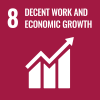Huaquillas, 9 May 2022 – From an early age, Keny knew that he wanted to become a doctor one day. Being born with a congenital malformation – a fibular hemimelia, as the doctors called it – meant that Keny needed to undergo multiple surgeries throughout his life.
“Much of my adolescence has been spent in hospitals around doctors and nurses,” he explains. “This has motivated me to get involved in this field and has confirmed my desire to help others.”
Keny went on to study medicine in Venezuela, his native country, for seven years and applied for a postgraduate degree in general surgery, but was only able to complete one of his three years of study. The social, economic, and political situation in Venezuela forced the 31-year-old to leave his home in 2018 and seek better opportunities in Ecuador.


Keny says he was changed by the year he spent working in a small town at Ecuador’s border with Peru. Photo: IOM/Ramiro Aguilar Villamarín
During his first year in Ecuador, as he was struggling to get his paperwork in order, Keny had to find the odd job here and there to make ends meet. His first job was as a bagger in a supermarket, working on tips and not a proper salary. He then worked as a driver, transporting goods across the country, and finally, he worked as a security guard for private events.
After a year abroad, despite difficulties in receiving his academic diplomas, his medical degree was finally recognized in Ecuador. Today, Keny is a doctor. After a long journey of dedication and patience, he can finally practice the profession he has always dreamed of.
Once he passed the test with Ecuador’s Secretariat of Higher Education, Science, Technology, and Innovation (Senescyt), he enlisted for his rural year in Zamora Chinchipe, in a small town called Paquisha, at Ecuador’s border with Peru.
There, everything was different for him – the culture, “the way of living life,” as Keny puts it.
Nevertheless, Keny was able to adapt without problems. “It was one of the most beautiful experiences that I have ever had, not only because of the memories that I have created but also because of all the professional experience I have gained.”
Keny works with the Ecuadorian Ministry of Public Health as a general practitioner for a health project that IOM implements with its partner ADRA. Photo: IOM/Ramiro Aguilar Villamarín
After finishing his practical year in the field, Keny was hired by the Ecuadorian Ministry of Public Health as a general practitioner for a health project that the International Organization for Migration (IOM) implements with its partner, the Adventist Development and Relief Agency (ADRA).
Caring for people on the move stirs up a lot of emotions for Keny. He also had to leave his home with only a suitcase; he also felt uncertainty and fear. Some had the option to leave Venezuela on a bus, or on a plane, but not everyone did, he says.
“These people’s resources are very limited, many had to come here on foot; the circumstances in which we arrive here may not be the same, but we can all understand the feeling.”


The team regularly conducts home visits to assess the health needs of those who cannot attend health appointments in person. Photo: IOM/Ramiro Aguilar Villamarín
Keny is happy to be able to provide some relief for those who reach Ecuador exhausted from walking. Some have pre-existing health conditions or suffer from chronic diseases, and many of them have not had access to proper treatment or periodic health examinations in a long time.
For women, there are generally no family planning services available. Some are pregnant while others arrive carrying children in their arms. “We provide them with appropriate information related to their reproductive rights and available services.”
As a doctor with the health project that IOM implements with ADRA, Keny refers people to suitable public health services. He visits shelters in different sectors of the city of Huaquillas and tries to cover as much ground as possible to help ensure that everyone has access to medical assistance. There are people who cannot attend medical appointments, so Keny makes sure appropriate specialists can conduct home visits.


Keny is proud of the work he accomplishes with his colleagues whom he sees today as close friends. Photo: IOM/Ramiro Aguilar Villamarín
Keny says that what he likes most about Ecuador is the food and the weather and, while there are similarities with Venezuela, the country is small, so everything is within reach. It doesn’t take long to get from the coast to the mountains, and the fauna and flora across Ecuador are so different and impressive.
“Also, the people – the human warmth.”
Keny loves his work because it is rewarding but also because of his colleagues. They do great work together, he says, but have also become friends outside work. “Ecuadorians have been very welcoming. There are many people who help you even when they themselves need help.”
On a professional and human level, Keny knows that helping and caring for people is the reason he chose this career. He says he doesn’t have too many elaborate dreams. “I only want to finish my specialty and one day go back to Venezuela to see my parents again.”
IOM’s medical programme in Ecuador is supported by the US State Department’s Bureau of Population, Refugees, and Migration (PRM).
This story was written by IOM’s Communication Team in Ecuador.



